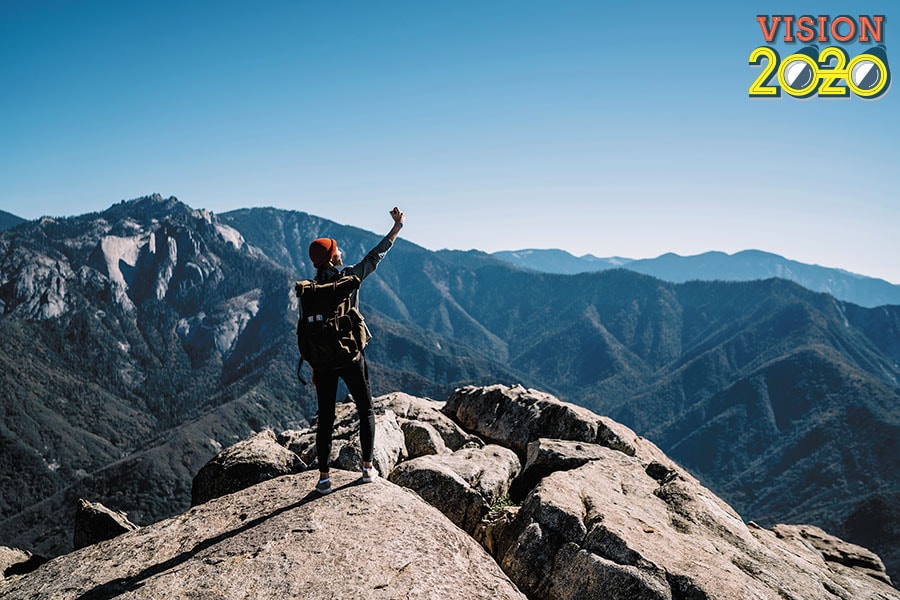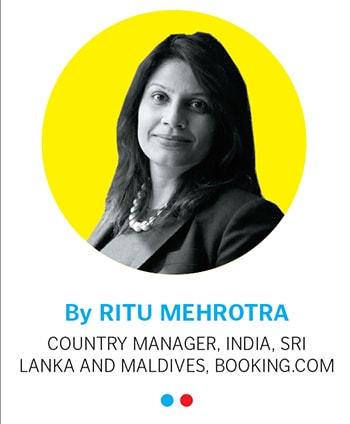'The 2010s saw the revolutionisation of travel'
Wanderlust experiences that were unthinkable previously are now possible because of personalisation and use of technology, writes Booking.com's Ritu Mehrotra


 Online travel agencies have opened up destinations that were once hard to get to
Online travel agencies have opened up destinations that were once hard to get to
Image: Shutterstock[br] India’s travel industry has grown extensively, motivated by higher disposable incomes, the emergence of homestays and other unique accommodation options, affordable airline fares, and increasing internet penetration across the non-metro cities. Currently, India is positioned as the world’s sixth-largest travel and tourism economy, with the sector contributing $234 billion, according to the BCG Travel Report, to the economy. Apart from the rapid infiltration of smartphones, the industry is witnessing the rising influence of social media communities and bloggers, leading to increased awareness about travel choices and preferences among travellers. As one of the fastest growing economies in the world, India has also gained a favourable spot for business in the travel and tourism sector. Now imagine traveling in 1998: Spending hours in a local travel agency, trying to combine your travel wishlist with your budget and choosing a destination accordingly, paying in cash, reading from the travel guides and most importantly, clicking photos with no social media to upload them. This concept of travel now seems like a distant reality. The last decade has seen revolutionisation of travel and the way people travel, greatly influencing the OTA (online travel agency) landscape in the country. This change is not limited to the type and frequency of holidays alone, but goes beyond to incorporate the nature of the trip, type of accommodations and experiences moving beyond mass to custom-made.
Now imagine traveling in 1998: Spending hours in a local travel agency, trying to combine your travel wishlist with your budget and choosing a destination accordingly, paying in cash, reading from the travel guides and most importantly, clicking photos with no social media to upload them. This concept of travel now seems like a distant reality. The last decade has seen revolutionisation of travel and the way people travel, greatly influencing the OTA (online travel agency) landscape in the country. This change is not limited to the type and frequency of holidays alone, but goes beyond to incorporate the nature of the trip, type of accommodations and experiences moving beyond mass to custom-made.
One of the first few forms of online travel bookings in India were of Indian Railways through their IRCTC website followed by airline bookings, slowly moving towards accommodation and now, to a consolidated trip. Looking at the journey of OTAs over the past few years, we’ve seen multiple factors determining the graph of acceptance and dependency. We’ve seen customer acceptance grow, with people initially being sceptical and unsure of using a digital travel platform and doing things in person, to now relying extensively on technology to take care of their bookings moving on from paper tickets delivered at their doorstep to the convenience of e-tickets. We’ve seen partner trust from airlines and properties come a long way too, which, coupled with consumer acceptance, has opened a whole new world of possibilities in travel.
Today a digital travel portal goes beyond facilitating a booking. It helps consumers weigh and compare different options—based on reviews, descriptions, facilities and ratings, supporting them with technology—providing them with different assets to help them choose better, including virtual tours, videos and pictures, and taking friction out of travel by bringing different elements of their trip under one umbrella. This includes transport, accommodation, attractions among others to enable them to customise and travel better. With the growing awareness in the sector by Indian travellers who are becoming digital-savvy, it is vital for brands to deliver a frictionless and seamless experience that meets customer expectations.
"The definition of travel is changing": Oyo"s Ritesh Agarwal
Digital India, increase in disposable income, growth of the OTAs and aviation industry together have transformed the travel landscape. But what really catalysed the growth of online travel bookings would be the usage of a variety of payment options at a click. Say a decade ago, the payment options were limited to cash, cheques and a few other forms of drafts. But today, Indians are swamped with a variety of payment options that empowers them to use their money at their discretion and convenience.
With the rise of the OTAs, the marketing in the industry too has evolved to the consumer’s benefit to help them choose better and provide them with deals and packages that help them plan their travel better and derive greater value for money. From sales people going door to door selling tour packages to billboards and newspaper pamphlets that carried discount coupons, we now see performance marketing.
The increased digital infiltration and dependency have also given birth to a new niche segment of custom-made experiential travel that a lot of startups now facilitate—be it a sustainable travel trip to electrify a village in the Himalayas with the Global Himalayan Expedition or experiencing the authentic culture of a remote tribe with Not on Map, further helping them sustain their community in exchange of unique travel experiences. The startup revolution is helping the sector grow and promote sustainable tourism within the country.
"We need to celebrate wealth creation": Cred"s Kunal Shah
As we proceed towards a new decade, we will see travel becoming more and more sustainable and technologically-advanced, further aided by enhanced services and offerings that enable the modern-day inquisitive traveller to experience the world. The year 2020 will be one of travel exploration like never before, fuelled by technology as well as a growing sense of responsibility and deeper connection with the people and places we visit. Travel companies will now work towards owning every facet of the traveller’s experience, from airport pick-ups to restaurant reservations to activities on their bucket list. It is what’s changing at the backend tech that will drive the next stage of evolution in the travel industry. All- immersive experiences are being created banked on digitisation. New-age technologies like artificial intelligence (AI) and machine learning will personalise suggestions beyond the level most people experience today. For instance, based on customer data, AI will select different hotel photos to show as preview snaps to different travellers viewing the same accommodation. Even the customer reviews displayed at the bottom might be different based on what the algorithm knows about the customer. These personalisation efforts will play a crucial role in converting a customer and building loyalty. Every customer on Booking.com is touched by machine learning today. And we predict that in three years, 50 percent of bookings will be touched by deeper forms of AI, delivering increasingly enhanced levels of personalisation and relevancy.
Evolving technology, the growth of OTAs, increasing incomes around the world, and a proliferation of budget airlines are some of the factors that have changed not only how we travel, but where we travel and what we want to see and do. OTAs have democratised travel and opened up destinations that were once hard to get to and experiences that were once hard to find.
First Published: Jan 07, 2020, 10:04
Subscribe Now